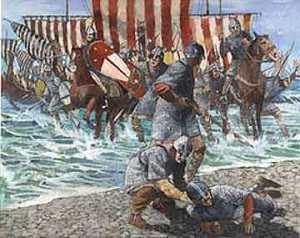Answering Fanmail
I will first preface with expressing my enjoyment of receiving fanmail. Thank you all who have written to me with compliments and questions, and I endeavor to respond to every fan. With that said, I would also like to announce that I will begin answering fan questions on my blog because there are so many great questions! Stay tuned once per week (hopefully Mondays) for a question and answer taken from fantail.
This week’s question is:
“Why did you chose to write your dialogue in contemporary English if it takes place in Viking times?”
My answer:
This question has surfaced more than once. When I began writing my novel, I considered writing the dialogue in a more antiquated style (as many authors do) to help set the mood of the time period. Many movies attempt to do this as well when creating period pieces, but they typically do a poor job and often mix-match various accents in English. Several authors have successfully pulled off antiquated dialogue, such as the work of Ken Follett and Bernard Cornwell.
My goal with the novel was to stay as true to history as possible. With that goal in mind, I examined the setting of The Line of His People and decided to write the dialogue in contemporary English for the simple fact that no one in the story is an Anglophone. Abriel is born and raised in France, and sails with Vikings from Norway. Therefore, writing in antiquated English — or Ye Olde English — would have been just as absurd as writing the dialogue in any other form of English because my characters did not in reality speak English. One must remember that in the time period in which I have written, no one spoke English or French — or Norwegian for that matter. Today’s languages have roots in the languages spoken in the early medieval period, but have changed into completely different languages since that time. In the novel, I explain that Abriel knows Frankish (really old French), Old Norse (really old Norwegian), Latin, and Greek. He learned three of these during his time at the monastery.
Since writing in an older or more antiquated form of English would not have made the novel any more historically accurate, I chose to write the dialogue in contemporary English to make my characters more identifiable with modern day readers. I wrote the novel as a Young Adult story, and I felt that young adults in their late teens and early twenties would enjoy language they could actually understand. As a teacher of the middle grades (grades 6-9), I know that writing funky foreign dialogue does not attract the readers I want to reach.
I must admit I have received criticism over my use of contemporary English in my dialogue, but I must reiterate that it would have made little sense to attempt otherwise in consideration of the linguistic background of my novel’s characters. Nevertheless, the sequel to The Line of His People follows the same style, and the story will not disappoint.
Thank you for your question, and thank you for reading!
Best wishes,
C.J.
Have a question for me? Email me at christopheadrienmat@gmail.com or send me a message on Facebook.






